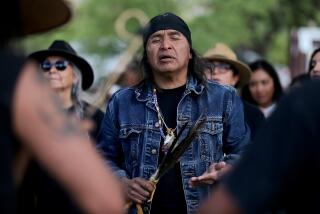Too far off the reservation for the Chumash
The Santa Ynez Band of Chumash Indians, which operates a popular casino and resort on its reservation northwest of Santa Barbara, is eager to expand beyond its current acreage. With that it mind, in 2010 it purchased a huge tract of land — nearly 1,400 acres — a few miles away and eventually announced plans to build houses on it. The tribe may have a persuasive case for building homes for more of its people among the vineyards of the so-called Camp 4 land. But the Chumash shouldn’t be able to exclude such a large swath of property from county rules and taxes by claiming tribal jurisdiction over the property.
Leaders of the Santa Ynez Band say that much of its 138-acre reservation is on a riverbank or a slope too steep to build on. As a consequence, only about one-sixth of the tribe’s 139 members and more than 1,300 descendants live there. Hence their interest in Camp 4, where they’ve proposed to build 143 single-family homes for tribe members and their families.
The tract is zoned for farms, which would allow barely a dozen homes to be built. Rather than pursue the exemptions and permits a private developer would need, however, the Chumash have sought a “fee to trust” transfer in Washington that would effectively add Camp 4 to their reservation. If the transfer is approved by either Congress or the Bureau of Indian Affairs, the tribe would be exempt from most local and state — but not federal — regulations. The land would also be freed from property taxes, although the tribe has offered to pay the county $1 million a year for 10 years.
The Chumash contend that Camp 4 is within the boundaries of the land the tribe had claimed before it settled on its reservation. That’s relevant because one purpose of the 1934 federal law that authorizes fee-to-trust transfers is to “restore Indian land bases.” At the time, though, Congress was trying to help tribes rebuild. Lawmakers didn’t anticipate the day when casinos and resorts gave tribes the ability to buy and develop tracts the size of small cities.
It’s one thing for tribes to stretch their reservations’ boundaries to add the space and resources needed to prosper. It’s another matter for tribes to buy a patchwork of tracts and develop them without being accountable for the effect on surrounding communities. And considering the wealth that some California tribes are starting to generate with their casinos, that’s no longer merely hypothetical.
Federal officials will have the ultimate say on the Santa Ynez Band’s fee-to-trust application, but their regulations require them to consider objections from local officials. Tribal leaders and county supervisors haven’t met to discuss Camp 4 — the tribe says it’s a sign of local officials’ bias, while some supervisors say the tribe hasn’t given enough specifics. The two sides should end the standoff and work out a solution to the tribe’s housing shortage that stops short of adding a huge and disconnected new tract to the reservation.
More to Read
A cure for the common opinion
Get thought-provoking perspectives with our weekly newsletter.
You may occasionally receive promotional content from the Los Angeles Times.






